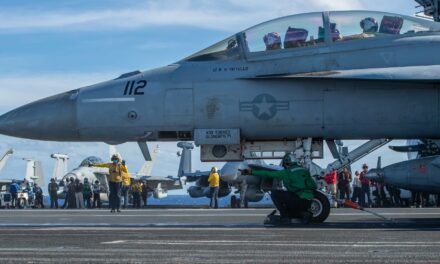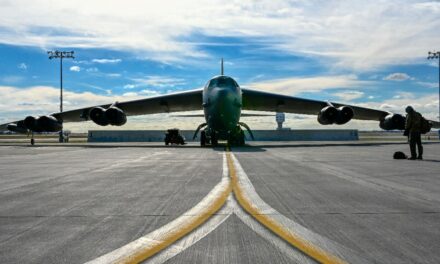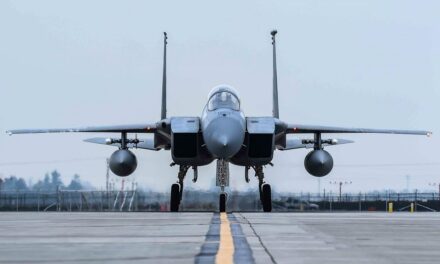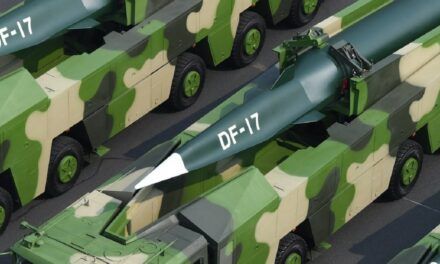We support our Publishers and Content Creators. You can view this story on their website by CLICKING HERE.
The Trump administration faces a historic opportunity to resolve the Western Sahara conflict. Centered on a disputed territory along North Africa’s Atlantic seaboard, where Morocco and the Algerian-backed Polisario Front have been locked in conflict since 1975, Western Sahara represents both a strategic opportunity and diplomatic expediency for the incoming administration—a tangible success that can strengthen America’s position as it confronts more complex challenges in Ukraine, Iran, Sudan, and Libya.
The U.S., building on the “peace through strength” doctrine that delivered the Abraham Accords, can positively transform regional dynamics. Unprecedented alignment between France, Spain, and potentially Mauritania, creates conditions for definitive resolution.
Resolving this conflict would secure three vital U.S. interests:
-preventing China from further expanding its influence in a strategically vital corridor between the Mediterranean and Atlantic;
-demonstrating America’s continued ability to shape outcomes in contested regions; and
-strengthening ties with reliable partners while forging new strategic alignments at a time of growing regional instability.
Failure to act decisively would risk ceding strategic initiative to Beijing, whose deepening industrial and security partnerships in North Africa might inevitably reshape regional dynamics.
The Strategic Imperative
The Western Sahara conflict, nearing its fifth decade, stands at a critical juncture. Traditional diplomatic frameworks, designed for a different era, now impede rather than facilitate resolution. The transformed diplomatic landscape presents unprecedented opportunities for decisive action.
U.S. recognition of Moroccan sovereignty within the framework of the Abraham Accords process, which saw Morocco establish diplomatic relations with Israel, has fundamentally altered the parameters for resolution. While the agreement included a U.S. pledge to opening a consulate in Dakhla—a commitment the Biden administration has not fulfilled—France’s subsequent alignment with this position creates historic consensus among key Security Council members, strengthening the foundation for lasting peace. Securing this diplomatic win early in the administration would demonstrate renewed strategic effectiveness while establishing a foundation for addressing more intractable regional challenges.
The Western Sahara resolution, building on existing policy frameworks, offers an achievable victory that can generate momentum for broader regional initiatives. This strengthened international consensus around Morocco’s autonomy plan as the only basis for resolution stands in stark contrast to the demonstrated failure of UN-led approaches centered on illusory options like partition.
The present moment is particularly significant due to unprecedented regional alignment on the path forward. For the first time, key stakeholders with historical and geographic proximity to the conflict—France and Spain—have converged in their support for Morocco’s autonomy plan as the most realistic and pragmatic solution.
This alignment can extend to Mauritania, which, while striking a delicate balance between Morocco and Algeria, maintains strong relations with France and stands as one of the West’s most reliable regional allies. The convergence of these critical actors, each with deep historical ties and direct interests in regional stability, creates a unique window for achieving lasting resolution.
The strategic context further demands immediate action. The territory’s strategic and economic potential remain largely underexplored, while global powers such as Russia and China vie to position themselves in Morocco’s transformative infrastructure projects, including in Western Sahara.
Growing Iranian influence in the region with reported touchpoints between Tehran’s proxies and Polisario, adds another layer of complexity. Beijing, in particular, has shown keen interest in the deep-water port of Dakhla, strategic railway connections, and Morocco’s broader development initiatives including 5G infrastructure and ambitious 2030 World Cup projects. Growing Chinese economic influence in Morocco threatens Western interests, demanding clear strategic direction from the U.S.
Diplomatic Reset
The incoming administration could initiate a managed transition from failed multilateral mechanisms to focused on bilateral frameworks. This begins with phasing out MINURSO’s obsolete mandate—an expensive and ineffective relic of the post-Cold War’s brief multilateral optimism. The mission’s continued presence perpetuates outdated assumptions about the conflict’s likely framework for resolution, consuming American resources better directed toward economic development and security cooperation.
Replacing the UN Secretary General’s Personal Envoy to Western Sahara with U.S. diplomatic efforts would streamline conflict resolution mechanisms and align them with current realities. This straightforward policy shift would allow for direct U.S.-led engagement while demonstrating diplomatic competence at a time when American leadership faces significant setbacks in the Sahel and is being tested from Ukraine to the Middle East.
Beijing’s transformative industrial presence in Morocco and strategic military cooperation with Algeria position it as a potentially credible mediator between Rabat and Algiers, much as it did in brokering Saudi-Iranian rapprochement. Anticipating such Chinese strategic entrepreneurship through decisive U.S. leadership and leveraging of existing regional alignments can help restore America’s position in the region.
Addressing Algeria’s Role and Regional Aspirations
Resolving the Western Sahara conflict requires a blunt approach to Algeria that balances accountability with recognition of its regional aspirations. Direct U.S.-led negotiations—which proved successful in the Abraham Accords process—can achieve more concrete results than decades of costly but sterile multilateral engagement. As North Africa’s largest country and a leading energy producer, Algeria sees itself as a regional military power with significant economic potential. The incoming administration should acknowledge this status while pressing for responsible leadership that befits a strong regional actor.
This means engaging Algeria as an important player whose cooperation is essential for regional stability and integration. Algeria’s concerns about shifts in regional power dynamics following Western Sahara’s resolution deserve consideration. The U.S. can help address these concerns through enhanced bilateral engagement, security cooperation frameworks, and economic partnerships that reinforce Algeria’s important regional role.
However, this recognition must come with clear expectations. As a regional power, Algeria bears special responsibility for perpetuating the Western Sahara dispute and must now demonstrate leadership in promoting regional stability.
The Algerian regime’s concerning pattern of domestic mobilization against Morocco, including through overtly militarized displays and rhetoric, has prompted Moroccan officials to warn against what they see as deliberate attempts to provoke military confrontation. The U.S. can leverage its strategic assets to work with Algeria to de-escalate tensions and embrace its potential role as a constructive regional actor rather than a spoiler of stability.
The administration should therefore pursue a dual-track approach: offering enhanced bilateral cooperation and recognition of Algeria’s regional importance while maintaining firm pressure for concrete de-escalation with Morocco. This could include structured dialogue on regional security architecture, energy and technological partnerships, and economic integration initiatives—all contingent on progress toward conflict resolution.
Implementing Morocco’s Autonomy Plan
While maintaining clear support for Moroccan sovereignty, the U.S. should encourage Rabat to develop a detailed, realistic implementation framework for its autonomy proposal. This framework should include concrete guarantees for an inclusive participation in territorial governance, providing a dignified path for transition from resistance to administration.
Key elements may include specific provisions for representation in local governance structures, including elected regional councils with substantive decision-making powers. The U.S. can provide expert guidance in designing transparency and monitoring mechanisms that build confidence in the autonomy arrangement’s implementation. This would demonstrate to all parties—including Algeria—that autonomy offers a genuine path forward rather than merely a diplomatic formula.
Economic Integration
The Abraham Accords framework provides a blueprint for creating positive incentives for resolution. Western Sahara’s strategic location along the Atlantic seaboard represents an unprecedented opportunity for regional power projection and maritime security cooperation.
The territory’s extensive coastline, particularly the Dakhla region, offers significant naval potential, renewable energy development, and maritime trade routes connecting Europe, Africa, and the Americas. Moreover, the Sahara is poised to become a crucial transit point for the African Atlantic Gas Pipeline bringing Nigerian gas to Southern Europe, a transformative project that will fundamentally reshape Africa’s energy landscape and strengthen Morocco’s position as a gateway for African energy resources to European markets.
A comprehensive development strategy would leverage this strategic position to create a hub for energy production and maritime commerce, while integrating the territory into broader Mediterranean and Atlantic economic frameworks.
Conclusion
The Western Sahara conflict represents a rare convergence of strategic necessity and diplomatic opportunity. With existing policy groundwork and significant political goodwill from 2020, unprecedented regional alignment, and clear U.S. interests at stake, the incoming Trump 2.0 administration can secure an early diplomatic success while preventing adversarial powers from reshaping North Africa’s strategic landscape.
Success requires incentivizing Algeria’s constructive engagement while maintaining strategic pressure, working with Morocco to implement autonomy provisions that ensure inclusive governance, and integrating the territory into broader regional economic frameworks.
Decisive action by the administration would prevent other powers from filling the diplomatic vacuum in North Africa. By leveraging newfound consensus among France and Spain, engaging resolutely with Algeria, and building on potential breakthroughs with Mauritania, U.S. leadership can put an end to this decades-long conflict that has impeded full economic integration between the Maghreb and wider Mediterranean region.
Resolving Western Sahara would demonstrate America’s renewed capability to achieve concrete results in complex regional disputes, establishing momentum for addressing broader challenges from Ukraine to the Middle East.
About the Author
Anime Ghoulidi is a Visiting Fellow in the Allison Center for National Security at The Heritage Foundation.

 Conservative
Conservative  Search
Search Trending
Trending Current News
Current News 





